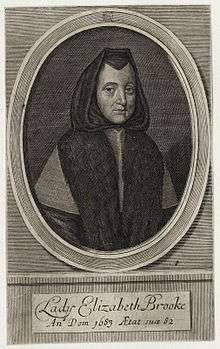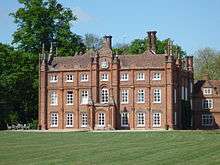Elizabeth Brooke (writer)
Elizabeth Brooke (January 1601 – 22 July 1683) was an English religious writer.

Born at Great Wigsell in the parish of Salehurst in Sussex, [1] Lady Brooke was the daughter of Thomas Colepeper (died 1613) and his wife Anne (died 1602), daughter of Sir Stephen Slaney (died 1608), a Lord Mayor of London, and his wife Margaret Phesant (died 1619).[2][1]

Her only brother was John, afterwards created Lord Colepeper of Thoresway.[3] Both parents having died in Elizabeth's early youth, she was brought up by Lady Slaney, her maternal grandmother.[4]
In 1620 she married Sir Robert Brooke of the Cobham family, educated at Emmanuel College, Cambridge, and a leading patron of devout clergy. He was the widower of Joan Slaney (died 1618), Lady Slaney's stepdaughter.[1] For two years the pair lived in London as boarders with Elizabeth's childless aunt Mary (died 1623), the wealthy and devout widow of Sir Humphrey Weld.[5][1] In 1622 they moved to Langley, Hertfordshire, where her husband bought a seat; and in 1630, on the Brooke estates falling to him, they went to the family mansion, Cockfield Hall at Yoxford in Suffolk. The couple had seven children: James and Anne died young, Robert and John died without children, Elizabeth and Martha married and had children, while the eldest daughter Mary stayed single.[1]

Lady Brooke was noted for her devotion to the Crown, to the Church of England, to charity, to learning and to personal piety. She mourned the beheading of King Charles I more deeply than the loss of a child. Though always conforming to the established Church, she approved of those who campaigned to include nonconformist ministers and personally supported individual ministers.[1]
She was an indefatigable reader of the scriptures, of biblical commentaries and of the ancient philosophers in English translations. She took notes of all sermons she heard and would question her family and servants about them. In 1631 she began a large volume[6] of Collections, Observations, Experiences, Rules, together with a work What a Christian must believe and practice. As well as setting herself strict rules of personal devotion, she supervised the household in twice-daily prayer and weekly catechesis. The poor in the locality and Christian ministers benefited from her charity.[1]
On 10 July 1646 her husband died,[7] and for two years she was away from Cockfield. She afterwards lost two daughters and a son; was harassed by lawsuits (though all these were eventually decided in her favour); and in 1669 her only surviving son, Sir Robert, was drowned in France, leaving her with the one child Mary. She recovered from her griefs sufficiently to resume her charities, but became deaf in 1675, and after long illness died at Cockfield on 22 July 1683.
Her chaplain Nathaniel Parkhurst, vicar of Yoxford where she was buried, preached her funeral sermon. Next year, he published it with a portrait, a biography and an appendix of her writings titled Observations, experiences, and rules for practice, dedicating the book to her daughter Mary.
References
- 1 2 3 4 5 6 7 Mendelson, Sara H. (Jan 2008), "‘Brooke , Elizabeth, Lady Brooke (1602?–1683)'", Oxford Dictionary of National Biography, Oxford University Press, retrieved 22 March 2016 Subscription or UK public library membership required
- ↑ Parkhurst, Faithful and Diligent Christian, p. 41
- ↑ ib. 42
- ↑ ib. 43
- ↑ ib. 45
- ↑ ib. 81
- ↑ ib. 43
![]() "Brooke, Elizabeth". Dictionary of National Biography. London: Smith, Elder & Co. 1885–1900.
"Brooke, Elizabeth". Dictionary of National Biography. London: Smith, Elder & Co. 1885–1900.
Bibliography
Parkhurst, Nathaniel (1684) The faithful and diligent Christian described and exemplified, or, A sermon with some additions preached at the funeral of the Lady Elizabeth Brooke.